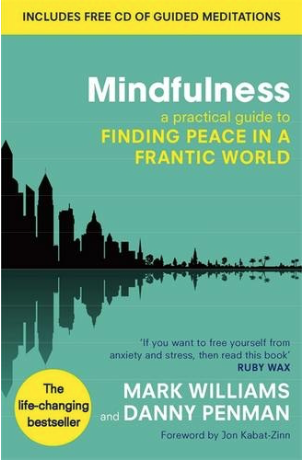We think Finding Peace in a Frantic World is a great mindfulness course

Developed by the Oxford Mindfulness Centre Mindfulness: Finding Peace in a Frantic World is a skills-based course rather than group therapy. It cultivates the following understandings:
- Mindfulness starts when we recognise the tendency to be on automatic pilot, which can rob us of our potential for living life more fully. We begin to practice stepping out of automatic pilot by bringing mindfulness to aspects of everyday present-moment experience that we might normally overlook.
- With greater awareness, we begin to notice how often we are lost in our thoughts and feelings. Mindfulness of the body and breathing helps us learn to recognize our thoughts, emotions, sensations, and impulses, gather the scattered mind, and return with appreciation to the here and now.
- We learn that when our attention is caught up in the past or the future, we can get trapped in unhelpful patterns of thinking, feeling, and acting. Mindfulness helps us recognise these automatic reactions, understand them as normal human experiences, and bring kindness and compassion to them.
- As we cultivate attitudes of interest and friendliness toward all of our experiences, whether pleasant or unpleasant, we learn skills for keeping our balance through life’s ups and downs, responding skilfully when difficulties arise, engaging with what is most important to us, and opening up to moments of joy, contentment, and gratitude. We learn to flourish.
What happens on the course?
Mindfulness: Finding Peace in a Frantic World runs over eight weeks. Sessions follow a consistent pattern. After greetings and getting settled, we begin with a guided meditation practice, followed by reflection on the experiences of the practice. Then we discuss the experiences of the home practices during the week. Each session has a theme that is woven into the discussions. We often do another short practice or a cognitive exercise and reflect on what can be learned from that. Near the end of each session, we explain the home practices for the following week.
If this is a course you attend in person (rather than online) then it’s best to arrive a bit early for each session. This helps to ensure a prompt start. Traffic can be unpredictable however please do join each session if you are late arriving.
The teachers are usually available after the session in case you would like to speak briefly to them individually.
What does home practice involve?
Teachers will introduce you to the main practices and ask you to practice up to an hour each day. You may need to reorganise aspects of your life to fit this in. It might be helpful to talk with family or friends about what is involved. If you find this difficult, experiment with practising at different times of the day, and remember to keep an open mind as best you can. You may notice that your experience changes from day to day or week to week. The teachers are available to discuss any difficulties you are having with home practice.
Who is the teacher?
Simon is listed on the British Association of Mindfulness Based Approaches (BAMBA). This means that he meets the UK Good Practice Guidelines for Mindfulness-Based Teachers; i.e., they are suitably trained, committed to continuous professional development, hold appropriate insurance and are receiving supervision for their teaching.
What are the challenges?
- At first, practising meditation may feel strange or unfamiliar. As best you can, keep an open mind.
- It is not obvious at the outset which practices will be most helpful and you may not see benefits immediately.Practise gentle persistence, and remember that people respond differently.
- The amount of practice can feel daunting. However, consistent practice may increase the likelihood of benefitting from the course.
- Some people feel apprehensive about being in a group. However, learning from others and seeing that you are not alone can be very beneficial.
- You may face emotional issues that you would prefer to avoid. Difficulties that arise can be informative and the course will teach you skilful ways of responding to them.
- You may find yourself wanting to give up at times. This is common. Please speak to a teacher about any issues that are making things difficult for you. Teachers are available after sessions, or you can email the OMC to ask a teacher to contact you.
Practicalities
- Try to attend every session, as they build on each other. Let the teacher know if you have to miss a session. Teachers will help you catch up with what you’ve missed.
- If you miss a session, it may feel difficult to come back. Come anyway!
- Wear comfortable clothes and dress in layers. Sessions may include sitting meditation, lying on the floor (if you choose), simple stretches, and gentle walking.
- Yoga mats and meditation cushions are sometimes provided, or you can bring your own. Please check with the teacher in advance if you need to loan meditation equipment.
- If you are attending an online course via Zoom, where possible please use a private space where you will not be disturbed so that you and the group can achieve the highest levels of participation and confidentiality. Where you are not in a private space, to support confidentiality we ask that you use a headset or earphones rather than the speakers on your device and as much as possible have your screen facing away from the others in the room.
- You will need to purchase a copy of the book that accompanies this course:
Mindfulness: Finding Peace in a Frantic World. It’s available from all good bookshops.

